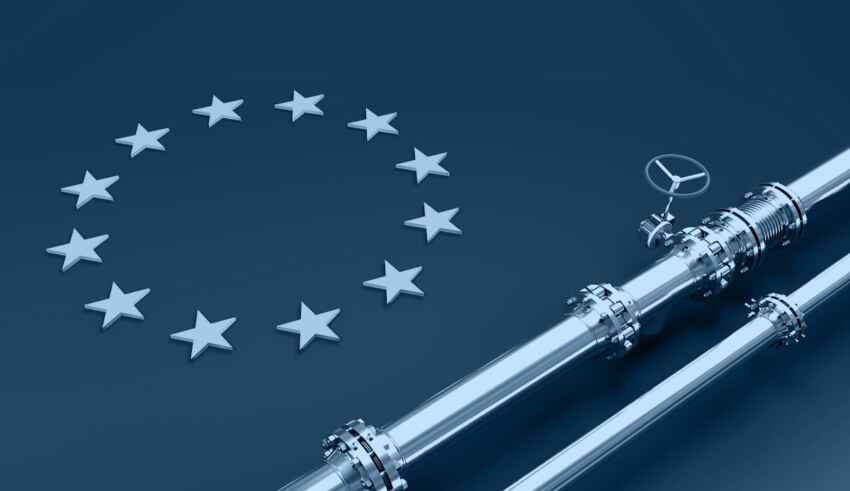
Europe’s dependence refers to the dependence of the European Union (EU) and its member states on external sources for various resources such as energy, raw materials, and technology.
This dependence on other countries became notable during the Covid-19 pandemic due to the lack of pharmaceutical materials and the strong dependence on China. Recently, this dependence has been exacerbated due to the Russian-Ukrainian war. The reason behind this is that Russia holds the position of the second-largest producer of natural gas globally and serves European energy consumers through multiple pipelines. Besides, the proximity and ease of transport means that supplies from the country account for around a third of all gas imported to the continent (Keane, 2022).
That is why a year ago, with war on Europe’s doorstep, the US set itself up as an energy partner for the EU market with the aim of eliminating the dependence on the Kremlin’s fossil fuel imports. However, ‘One man’s meat is another man’s poison’ this is to say that some EU countries are opposed to breaking their nuclear dependence on Moscow, one example being Hungary, which relies heavily on the Kremlin to maintain its nuclear fleet (Montes, 2023).
Nevertheless, Europe’s reliance is not only limited to the energy industry but also extends to the technology sector and pharmaceutical sector as mentioned previously. In terms of raw materials, China is the country that provides them as it controls 36.7% of the global reserves of ‘rare earths’ and critical raw materials. Generally, raw materials have been overlooked by Europe in the recent geopolitical competition, which has been primarily centered on the dominance of certain technologies such as AI, semiconductors, among others, rather than the resources required to attain this dominance. Besides, it should be noted that these materials are of great importance for Europe, they are the gold for the climate transition as they enable the production of key technologies for the green transition- such as wind turbines, solar panels, and batteries for electric vehicles- and for the digital transition (Lory, 2022)
Thus, the question that emerges is how to put an end to Europe’s reliance on these resources?
This is not an easy question to answer as achieving independence from third countries requires a collaborative effort by all member states, bearing in mind different interests and preferences.
However, there is a silver lining, as the European Parliament approved this year the European Chips Act. This law is a positive development, as it aims to double semiconductor production in the European Union by 2030, with the goal of reaching 20% of global manufacturing and mitigating future supply problems such as those seen during the coronavirus pandemic. With the aim of addressing China’s growing dependence on raw materials and establishing stronger supply chains, Ursula von der Leyen, President of the Commission, announced a new legislative proposal: the Critical Raw Materials Act (Perez-Cejuela, 2023) (European Parliament, 2023) (Noyan, 2022).
The issue of dependency has become a growing concern as it can lead to vulnerabilities in the EU’s economic and political systems and affect its ability to respond to global challenges such as climate change and geopolitical shifts. Therefore, it is crucial for Europe to continue working together towards reducing its dependency on others by encouraging greater self-sufficiency in key areas and diversifying supply chains (e.g.: European gas pipeline construction project) (Borrell, 2023) (European Commission, 2022).
The fact of promoting a more diversified and sustainable supply chain, will enable Europe to mitigate the risks associated with over-dependence, such as supply disruptions, political conflicts, or economic crises. This will not only create a more secure future for the EU and its citizens, but also lead to greater economic and political independence, enabling Europe to respond effectively to global challenges and pursue its strategic interests with confidence (M. West, 2022).
References:
• Keane, S. (2022). La crisis de Ucrania pone de manifiesto la dependencia europea del gas ruso. Schroders. Retrieved from: https://www.schroders.com/es-es/es/inversores-particulares/visión-de-mercado/la-crisis-de-ucrania-pone-de-manifiesto-la-dependencia-europea-del-gas-ruso/
• Montes, L (2023). La UE se acerca a EEUU para romper con la dependencia nuclear de Moscú. The Economist. Retrieved from: https://www.eleconomista.es/energia/noticias/12216595/04/23/la-ue-se-acerca-a-eeuu-para-romper-con-la-dependencia-nuclear-de-moscu.html
• Lory, G (2022). Europa busca sus tierras raras para reducir su dependencia. myEurope. https://es.euronews.com/my-europe/2022/09/27/europa-busca-sus-tierras-raras-para-reducir-su-dependencia
• Perez-Cejuela, L (2023). La Eurocámara aprueba la ley para aumentar la producción europea de chip. EURACTIV. Retrieved from: https://euroefe.euractiv.es/section/consumo/news/la-eurocamara-aprueba-la-ley-para-aumentar-la-produccion-europea-de-chips/
• European Parliament (2023). Chips Act – the EU’s plan to overcome semiconductor shortage. Retrieved from: https://www.europarl.europa.eu/news/en/headlines/society/20230210STO74502/chips-act-the-eu-s-plan-to-overcome-semiconductor-shortage#:~:text=The%20European%20Chips%20Act%20aims%20to%20increase%20the%20production%20of,for%20negotiations%20with%20EU%20governments.
• M. West, D. (2022). Six ways to improve global supply chains. Retrieved from: S https://www.brookings.edu/research/six-ways-to-improve-global-supply-chains/ix
• Borrell, J. (2023). A year of war and energy climate crisis. European External Action Service. Retrieved from: https://www.eeas.europa.eu/eeas/year-war-and-energy-and-climate-crises_en
• European Commision (2023). REPowerEU: A plan to rapidly reduce dependence on Russian fossil fuels and fast forward the green transition*. Retrieved from: https://ec.europa.eu/commission/presscorner/detail/en/IP_22_3131
• Noyan, O (2022). EU aims to lessen dependency on China with Raw Materials Acts. Retrieved from: https://www.euractiv.com/section/circular-economy/news/eu-aims-to-lessen-dependency-on-china-with-raw-materials-act/
By The European Institute for International Law and International Relations.















